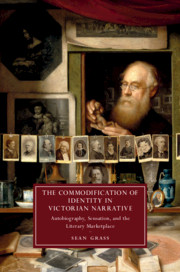‘This thoroughly researched and carefully documented work will be of interest to students of Victorian literature, history, publishing, and economics.’
J. D. Vann
Source: Choice
‘The Commodification of Identity offers us new ways of conceiving the relationship between the dissolution of identity and the explosion of commercial life-writing in the Victorian era … It is part of a distinguished series of monographs on Victorian literature, the Cambridge Studies in Nineteenth-Century Literature and Culture.’
Robert L. Patten
Source: Dickens Quarterly
‘Grass’s readings of mid-to-late-century fiction are precise, multi-dimensional and persuasive, and the unusual collocation of texts works well.’
Trev Broughton
Source: Journal of Victorian Culture
‘… offering both a concrete representation of the ‘literary market’ and an expansive sense of what might be included in the category of the economic, Grass’s account is full of fascinating detail and revelatory analyses. In tracing how identity came to be conceived as textual, transactional, and exchangeable … Grass offers new frameworks for understanding Victorian life writing, fiction, and the period’s innovative economic and bureaucratic cultures …The Commodification of Identity in Victorian Narrative … challenge[s] us to keep imagining terms that capture the flexibility of Victorian economic life and its narrative situations.’
Aeron Hunt
Source: Nineteenth-Century Literature
‘The Commodification of Identity in Victorian Narrative is a bravura performance, resting on extensive bibliographical research and a conceptually rigorous reading of a group of 3476 novels which Grass claims constitute a turning point in the modern representation of personal development over time. In every sense it is immersed in texts, both as constituents of a critical phase of book history, and as the means by which identity was structured and understood in mid-Victorian England.’
David Vincent
Source: Victorian Studies





